
|
Astronomy Picture Of the Day (APOD)
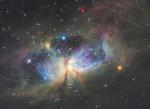 Star Forming Region S106
Star Forming Region S106
20.02.2001
Massive star IRS4 is beginning to spread its wings. Born only about 100,000 years ago, material streaming out from this newborn star has formed the nebula dubbed Sharpless 106 Nebula (S106), pictured above.
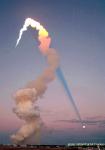 Shuttle Plume Shadow Points to Moon
Shuttle Plume Shadow Points to Moon
19.02.2001
Why would the shadow of a space shuttle launch plume point toward the Moon? Two weeks ago during the launch of Atlantis, the Sun, Earth, Moon, and rocket were all properly aligned for this photogenic coincidence.
 Lunation
Lunation
18.02.2001
Our Moon's appearance changes nightly. This slow-loading time-lapse sequence shows what our Moon looks like during a lunation, a complete lunar cycle. As the Moon orbits the Earth, the half illuminated by the Sun first becomes increasingly visible, then decreasingly visible. The Moon always keeps the same face toward the Earth.
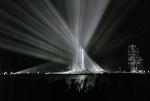 Happy Birthday Jules Verne
Happy Birthday Jules Verne
17.02.2001
One hundred seventy-three years ago on February 8th, Jules Verne was born in Nantes, France. Inspired by a lifelong fascination with machines, Verne wrote visionary works about "Extraordinary Voyages" including such terrestrial travels as Around the World in 80 Days, Journey to the Centre of the Earth, and Twenty Thousand Leagues Under the Sea.
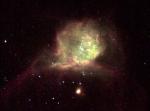 Star Forming Region Hubble X
Star Forming Region Hubble X
16.02.2001
In nearby galaxy NGC 6822, this glowing emission nebula complex surrounds bright, massive, newborn stars. A mere 4 million years young, these stars condensed from the galaxy's interstellar gas and dust clouds.
 Jupiter Unpeeled
Jupiter Unpeeled
15.02.2001
Slice Jupiter from pole to pole, peel back its outer layers of clouds, stretch them onto a flat surface ... and for all your trouble you'd end up with something that looks a lot like this. Scrolling right will reveal the full picture, a color mosaic of Jupiter from the Cassini spacecraft.
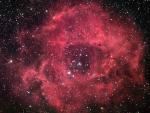 The Rosette Nebula
The Rosette Nebula
14.02.2001
Would the Rosette Nebula by any other name look as sweet? The bland New General Catalog designation of NGC 2237 doesn't appear to diminish the appearance of the this flowery emission nebula. Inside the nebula lies an open cluster of bright young stars designated NGC 2244.
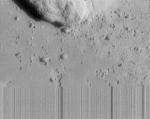 NEAR Spacecraft Survives Landing on Asteroid Eros
NEAR Spacecraft Survives Landing on Asteroid Eros
13.02.2001
Yesterday NEAR-Shoemaker became the first spacecraft to land on an asteroid and send signals back from its surface. Since the robot spacecraft was not designed for such a contingency, the success of the landing on asteroid 433
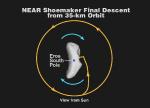 Approaching Asteroid Eros
Approaching Asteroid Eros
12.02.2001
Today, at about 3 pm EST, the first human-made spacecraft is scheduled to touchdown on an asteroid. At an impact speed of 8 kilometers per hour, it is most probable that the robot spacecraft NEAR-Shoemaker will not survive its planned collision with 433 Eros.
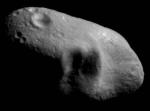 NEAR Shoemaker Views Eros
NEAR Shoemaker Views Eros
11.02.2001
Orbiting asteroid 433 Eros, 145 million miles from Earth, NASA's NEAR spacecraft has been returning stunning views as its year long mission of exploration nears completion. A mosaic of NEAR images recorded at a range of about 127 miles, this picture illustrates some of the amazing
|
January February March April May June July August September October November December |
|||||||||||||||||||||||||||||||||||||||||||||||||